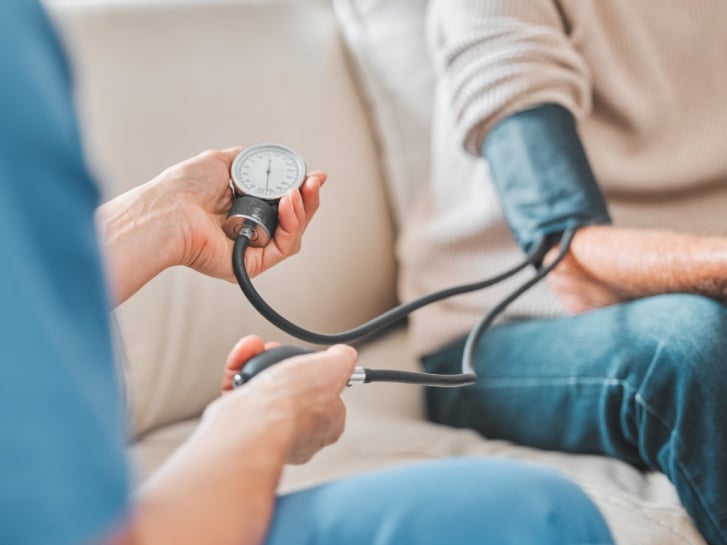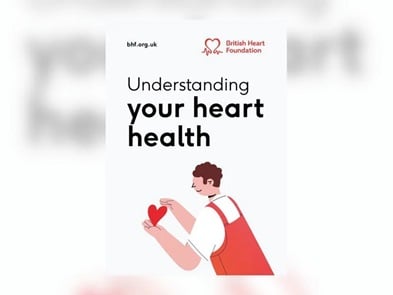
Menopause and your heart
Before the menopause, women in general have a lower risk of being affected by coronary heart disease. But after the menopause, your risk increases.
Does the menopause affect your cardiovascular disease risk?
The menopause is when you stop having periods and can’t get pregnant naturally. It usually happens between 45 and 55 but can happen earlier (early menopause) or later.
Your periods stop because your ovaries stop producing as much of the hormone oestrogen and don't release an egg each month. The levels of progesterone and testosterone also go down. The fall in oestrogen causes most of the symptoms of menopause.
Your oestrogen levels usually start to go down before your periods stop. This period of time leading up to the menopause is called perimenopause. You may start getting menopausal symptoms during the perimenopause, even if your periods have not stopped.
Oestrogen has a protective effect on your heart. It helps to control your cholesterol levels and reduces the risk of fat building up in your arteries. It also helps keep your blood vessels healthy.
If your oestrogen levels fall, then fat can build up in your arteries causing them to become narrower. This increases your risk of developing coronary heart disease, a heart attack or stroke.
The menopause can also cause changes in your body that increase your risk of coronary heart disease.
- Weight gain – many people report putting on weight during and after the menopause, especially around their waist.
- High cholesterol – after the menopause your cholesterol levels can go up, increasing your risk of heart attack and stroke.
- Your body cannot control sugar levels (glucose) as well – this can increase your risk of diabetes, high blood pressure and weight gain (metabolic syndrome).
- Your blood pressure may go up – your blood vessels may not respond as well to change, meaning your blood pressure could go up.
- Increased amount of fat around the heart – this could increase after the menopause.
Many people worry about their heart health when going through the menopause and want to know what their risk is. Your doctor can talk you through your individual risk factors. You can also take steps to manage your risk and take care of your heart health.
Does early menopause affect your cardiovascular risk?
If you have early menopause (before the age of 45) you have a higher risk of coronary heart disease. This is because there’s less oestrogen in your body from an earlier age.
Going through the menopause early can be very difficult, and you may feel alone and unsure where to go for support. The Daisy Network is a charity offering support to people going through early menopause. You can also download the Balance app for support with early menopause and find helpful tips for coping with symptoms on the Rock My Menopause website.
It’s important to know what your level of risk is and what you can do to reduce it. Speak to your doctor about your risk factors and whether hormone replacement therapy (HRT) could help lower your risk.
Are menopause symptoms a sign of a heart condition?
Symptoms of the menopause can have a big impact on your daily life and wellbeing. For some people symptoms stop after perimenopause or the menopause, but sometimes they can last longer.
Many people worry that their symptoms could be a sign of something else, like a heart condition or dementia.
For example:
- feeling your heart racing or heart palpitations are common symptoms of the menopause for many women
- aches and pains, including in the chest area
- finding it difficult to concentrate or feel more forgetful (brain fog)
- weight gain.
However, these are likely to be caused by your changing hormone levels.
What are the symptoms of a heart attack?
Heart attack symptoms can vary but the most common signs of a heart attack are:
- chest pain or discomfort that suddenly occurs and doesn’t go away. It may feel like pressure, squeezing or heaviness in your chest. It can feel like indigestion or a burning sensation
- pain that may spread to your left or right arm or may spread to your neck, jaw, back or stomach
- feeling sick, sweaty, light-headed or short of breath.
Find more information about heart attack symptoms.
Although more research is needed to understand why symptoms, such as heart palpitations, happen, there are things you can do to improve your menopausal symptoms. Cognitive behavioural therapy (CBT) has been shown to help with heart palpitations, hot flushes and night sweats. The Balance website also has information on managing menopausal symptoms.
Leading up to and during the menopause you may feel more worried than usual. Relaxation techniques, such as meditation and yoga, can help with anxiety, stress and menopausal symptoms. Some people have also found complementary therapies such as acupuncture, aromatherapy, massage and reflexology helpful to reduce stress and improve menopausal symptoms.
If symptoms are having an impact on your quality of life or you’re worried they could be a sign of something else, speak to your doctor.
What can I do to reduce my risk and improve symptoms?
There are things you can do to reduce your risk of coronary heart disease before, during and after the menopause.
One of the most important things you can do is to consider how you can make healthier lifestyle choices, as these will help lower or maintain your blood pressure and cholesterol levels. These healthy lifestyle choices can also help your menopause symptoms.
Change can feel overwhelming, and it may feel difficult to know where to start when you’re having menopausal symptoms. Small changes can make a big difference, and the following tips can help it to feel more manageable.

Maintaining a healthy weight
During and after the menopause it can be harder to maintain a healthy weight. You could try a few food swaps, such as:
- swap crisps for a handful of unsalted nuts
- swap full fat milk for semi skimmed, 1% or skimmed
- choose reduced fat and sugar options for foods like yoghurts or cheeses
- swap butter for spreads made from olive, rapeseed or sunflower oils.
You can also make small changes in your daily routine, such as:
- walk or cycle short journeys instead of driving
- take the stairs instead of an escalator or lift
- get off the bus a stop earlier than normal
- listen to your favourite music or podcast while walking.
Eating a healthy, balanced diet
Healthy eating is about eating a wide variety of foods in the right amount, so your body has what it needs.
Reducing your salt and saturated fat intake during the menopause is important because your cholesterol and blood pressure may be higher. By eating more fruit and vegetables, and less foods that are high in saturated fat, sugar and salt you can help lower your risk of coronary heart disease.
You can start by making small changes, such as:
- have a side salad with your lunch or dinner
- add a vegetable to your dinner, such as adding veggies into fajitas or sauces
- swap some red meat for pulses, use half mince meat and half lentils or kidney beans in a chilli or bolognese
- swap meats for fish (white or oily) or try eating a vegetarian meal once or twice a week instead of meat
- add fruit, like blueberries or bananas, to your cereal rather than sugar
- swap white bread for wholemeal
- eat wholewheat pasta and rice.
You can find more food swap ideas and healthy eating tips in our booklet Eat Better. You may also find our articles 13 small changes that add up to a healthy diet and healthy food swaps useful.
During and after the menopause your bones can become less strong. Increasing the amount of calcium you have during the menopause can help improve your bone strength. Good sources of calcium include milk, yogurt and other dairy foods, as well as green leafy vegetables, pulses, beans and fish with edible bones (such as anchovies or sardines).
You could also take a vitamin D supplement to help keep your bones healthy. It’s recommended to take 10mcg a day from September to April, but you can take it all year round.
Although a moderate amount of tea or coffee (four or five cups a day) is not harmful to your heart health, cutting down could help with menopausal symptoms. Try swapping to decaf or having 3 cups of tea instead of 4. You may find this helps with heart palpitations and hot flushes.
Increasing your activity levels
Increasing your activity levels has a number of benefits, it can help to maintain a healthy weight, reduce feelings of anxiety and low mood, and improve your heart health.
Exercise has also been shown to help menopausal symptoms, such as difficulty sleeping and mood changes.
However, the thought of increasing activity levels or exercising can seem overwhelming especially if you have a heart condition or limited mobility. This can make exercise more difficult.
You can make it more manageable and enjoyable by starting small and building it up over time. It can help to:
- find exercise you enjoy, for example walking, swimming or gardening
- join a local club or class
- build exercise into your daily routine, like walking short journeys or using the stairs instead of a lift.
If you find exercising more difficult, these tips may help:
- exercise with the help of a chair or try chair-based exercises
- speak to your doctor to see if there are any local exercise schemes available
- find information on exercising with side effects, such as shortness of breath.
Try our quiz to find out which fitness activity suits you and read our information on exercising with health issues. You can find more information on exercise and being active in our Heart Matters magazine.
Reducing the amount of alcohol you drink
Experts recommend you drink less than 14 units per week. Reducing the amount of alcohol you drink can also help with menopausal symptoms, such as hot flushes and heart palpitations. For some people, drinking is an important part of their social life, and it can feel daunting to think about cutting down.
However, there are ways to socialise and drink less, you could try:
- a half pint, instead of a pint
- a single shot of spirits, instead of a double shot
- switching to alcohol free versions of beer, wine or spirits
- swap pub nights for an activity with your friends.
Not smoking
If you smoke, you may find you smoke more during times of stress, such as the menopause. This can make it harder to cut down or quit smoking. However, smoking can make menopausal symptoms, such as hot flushes and heart palpitations, worse.
To help cut down or quit smoking you could:
- gradually reduce the amount of cigarettes, or tobacco, you have each day
- try nicotine replacements, such as patches, gums or lozenges
- swap daily habits, like smoking first thing in the morning, with a warm drink or a short walk
- call the Smokefree Helpline or find a stop smoking service near you for free support to stop smoking.
We have lots of information on nutrition, wellbeing and recipes in Heart Matters magazine. You can also speak to our cardiac nurses by calling our Heart Helpline.
HRT: benefit or risk to your heart?
Hormone replacement therapy (HRT) can help treat symptoms of the menopause such as hot flushes, night sweats and low mood. It replaces the hormones in your body that are changing, such as oestrogen.
There’s also evidence that HRT can reduce your risk of developing coronary heart disease, or of having a heart attack and stroke. This is because it replaces hormones in your body, which can help to protect your heart.
Evidence shows that HRT should be started within 10 years of starting the menopause and before the age of 60. The earlier HRT is started, the more effective it is at protecting your heart and reducing your risk of coronary heart disease.
It's thought that HRT can have a positive effect on your cholesterol levels, however some types of HRT can increase your cholesterol levels. Talk to your doctor if you have high cholesterol.
HRT tablets can slightly increase your risk of blood clots and a stroke, but the risk is low for women under 60. Most women are prescribed HRT through the skin (such as HRT patches). If you’re worried about this, speak to your doctor about having HRT as a patch or gel instead.
People worry about taking HRT because of the risk of developing other conditions. The risks are usually outweighed by the benefits, but it’s important to make a decision that’s right for you.
To help you decide you can:
- talk to your doctor about whether HRT is right for you
- find out if there is a menopause expert at your GP practice or within your local area that you or your doctor can ask for advice
- find more information on HRT and the benefits and risks from trusted sources
Hormone therapy that’s given for gender transition (gender-affirming hormone therapy) may affect your heart and risk of heart disease. There’s currently not enough evidence to be sure. Read more about transgender heart risk.
Can I take HRT if I have an increased risk of a heart attack or stroke?
You may be able to take HRT if your risks factors are well managed. Risk factors that are important to consider for the menopause include:
- high blood pressure
- high cholesterol
- living with excess weight
- smoking.
Speak to your doctor for more information and to discuss whether you can take HRT.
Can I take HRT if I have a heart condition?
If you have a heart condition or you’ve had a heart attack or stroke you may want to know if you can take HRT.
If you’re living with a heart condition it may be possible for you to take HRT, but it will depend on your individual circumstances and risk factors. Speak to your doctor for more information and to discuss whether you can take HRT.
If you’ve had a heart attack or stroke, a decision to stop your HRT may be made because the risks outweigh the benefits in your situation. It’s important to speak to your doctor before you stop taking any medicines.
You may be able to take HRT after a heart attack if you, a menopause specialist and a cardiologist decide it’s okay to. Speak to your doctor about alternatives you could take.
If you’re not able to take HRT for medical reasons, or you don’t want to take it, there is support for you. The Balance website has information on managing menopausal symptoms beyond HRT.
More information and support
Going through the menopause can be difficult and symptoms can have an impact on your daily life and wellbeing. There are places that offer menopause support to help.
- find information and support with The Menopause Charity
- download the balance app for support with menopause and early menopause
- read more information about the menopause on the NHS website
- get support with early menopause from the Daisy Network
- improve menopause support at your work with See Her Thrive
- listen to a podcast or find more information at Rock My Menopause.
Whether you’re worried about your risk of developing coronary heart disease, or you’re living with a heart condition, there are places that can support you.
- speak to our cardiac nurses by calling our Heart Helpline
- find more information on heart risk, miscarriage, periods and early menopause.

You can trust our health information
We've followed an eight-step process to make sure this content is reliable, accurate and trustworthy.
Learn how we make our health content.Donate today


More information


Treatments


